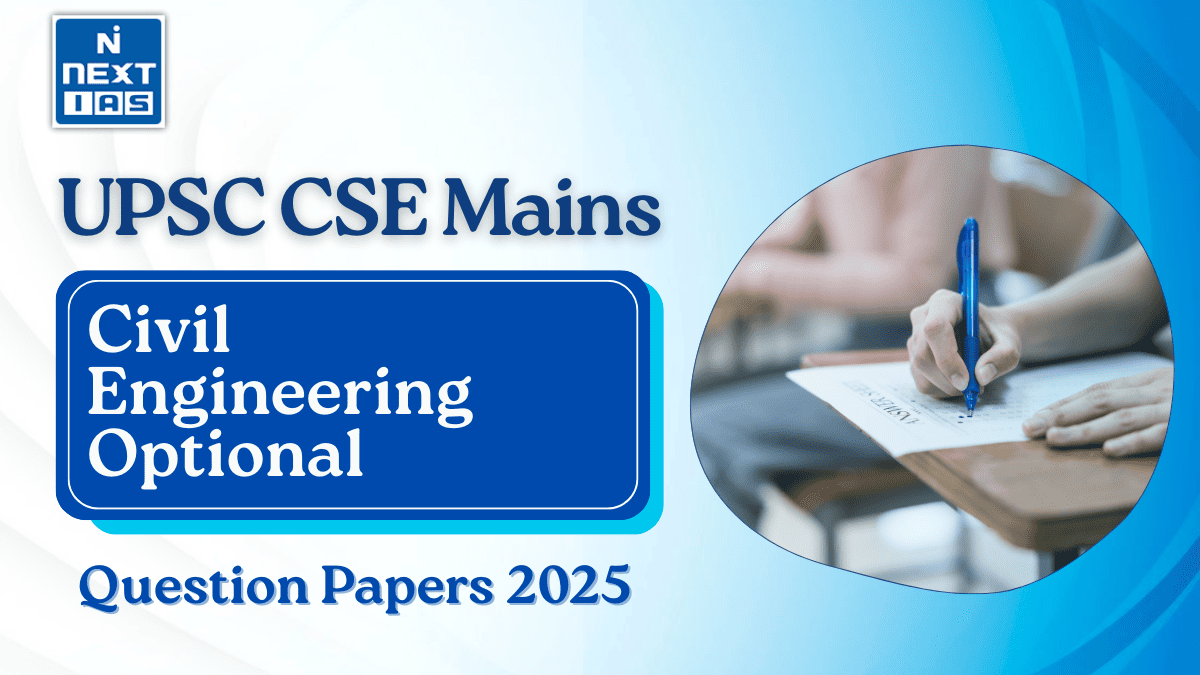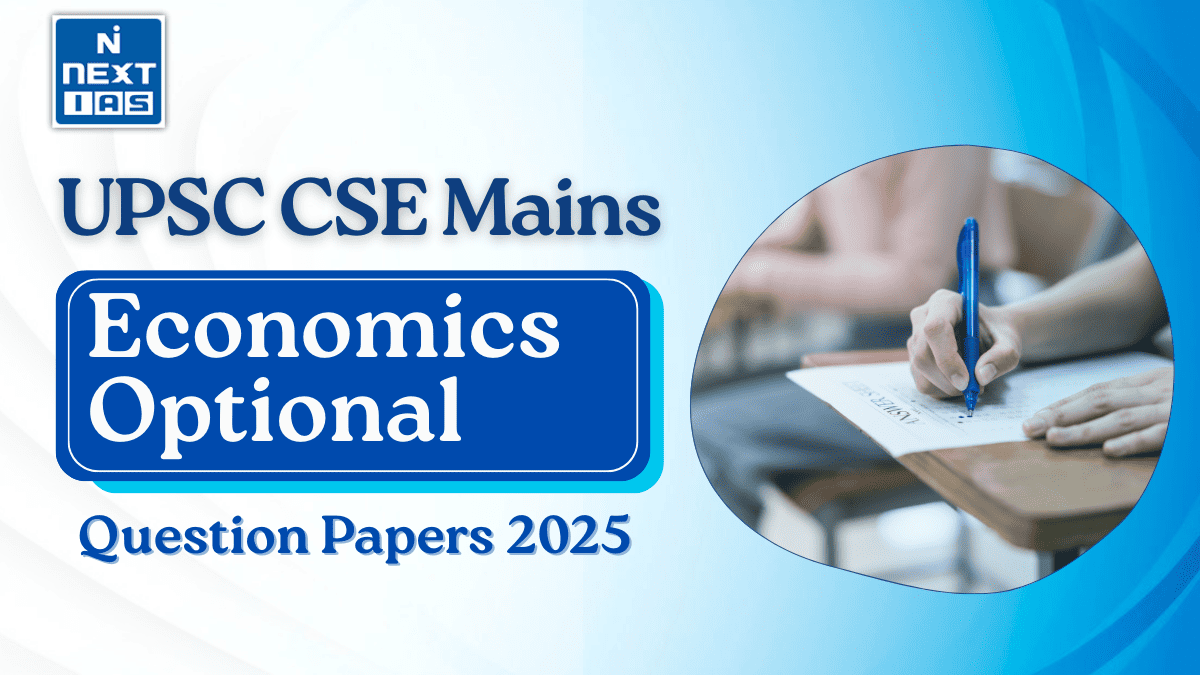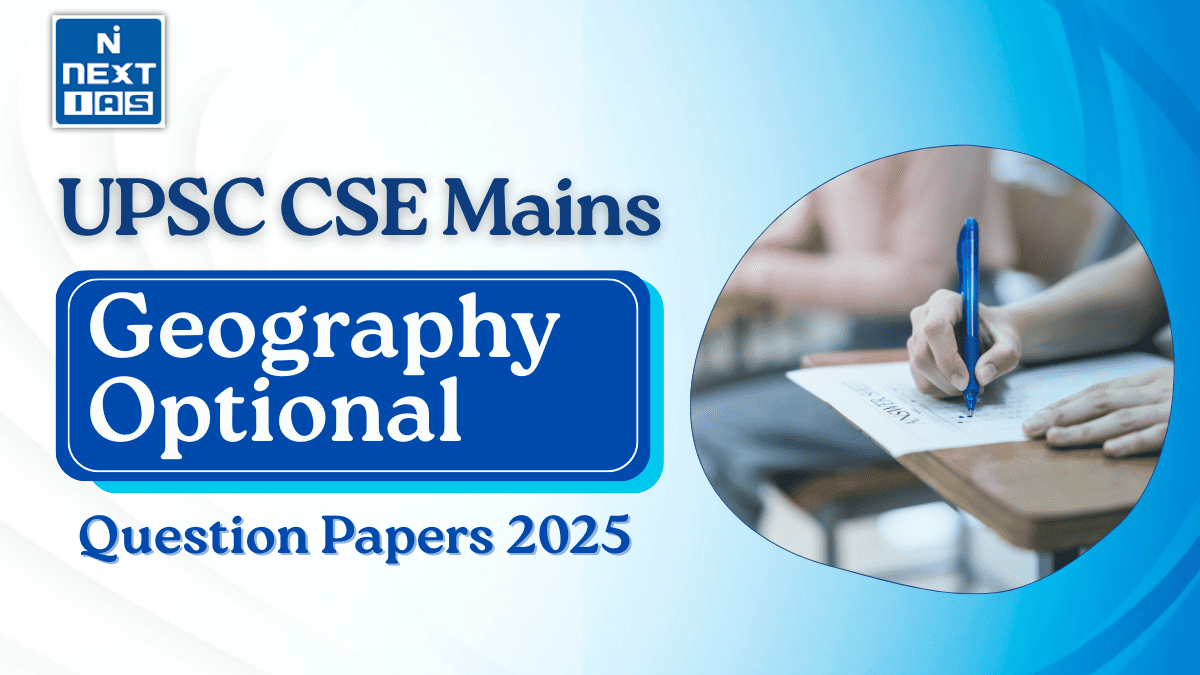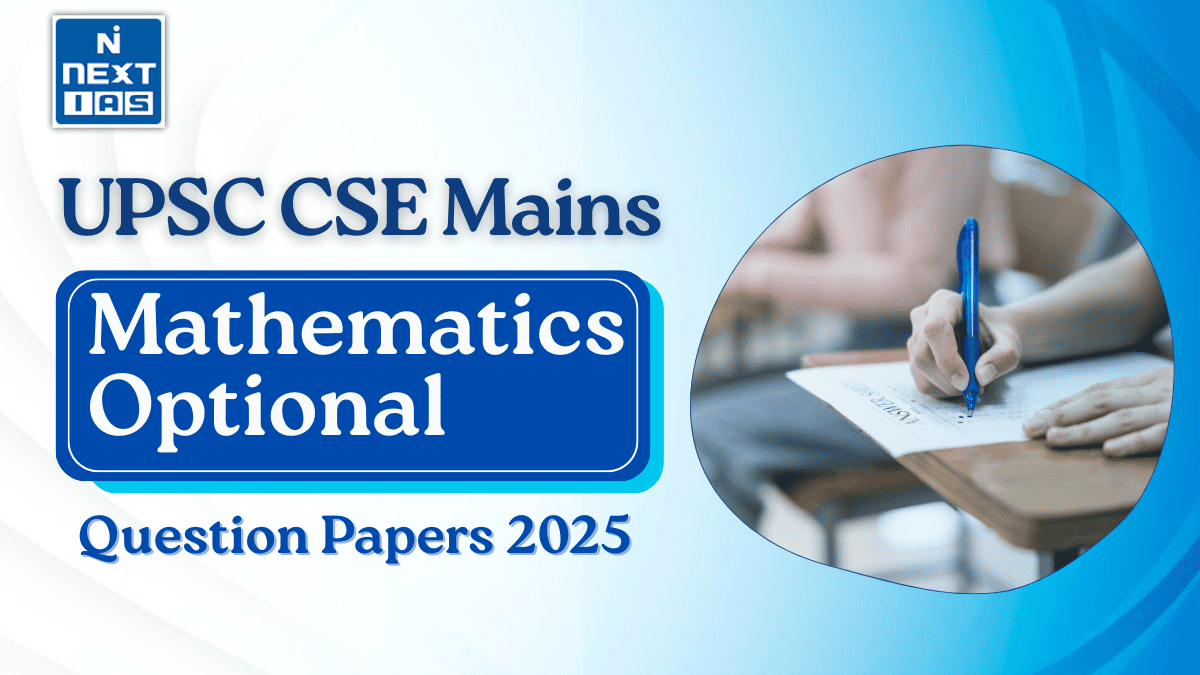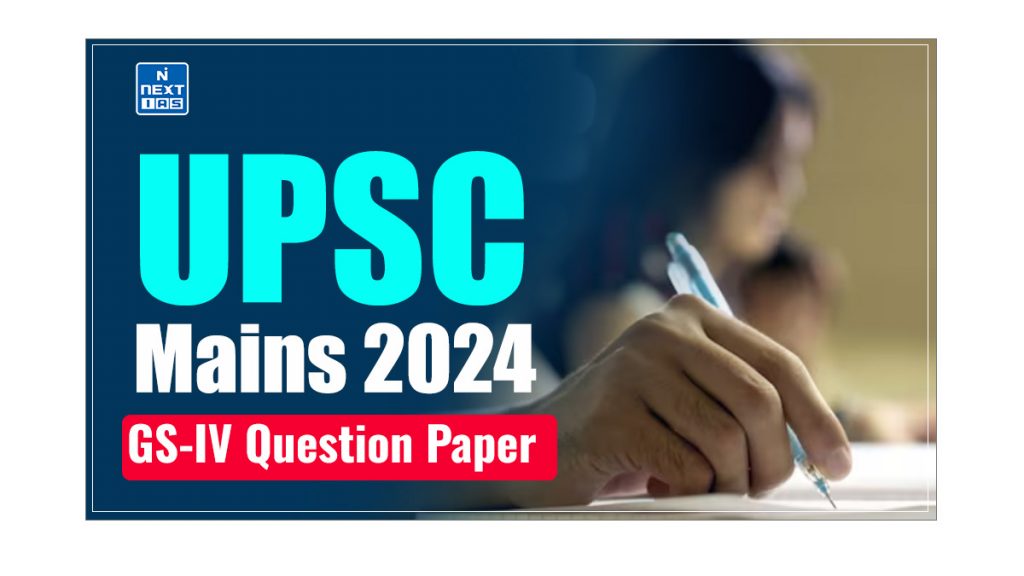
The Union Public Service Commission (UPSC) conducted the CSE Mains 2024 General Studies Paper-IV (GS-IV) on September 22, 2024. This paper evaluates candidates on critical aspects such as Ethics, Integrity, and Aptitude, which are essential for public administration and governance. Understanding the themes and complexity of questions in GS-IV is vital for aspirants, as this paper tests their moral and ethical reasoning. Those preparing for the UPSC CSE must stay informed about the key topics that UPSC focuses on in this crucial paper.
UPSC Mains 2024 GS-IV Exam: Key Highlights
| UPSC Mains GS-IV Exam Date | September 22nd, 2024 |
| Total Marks | 250 Marks |
| Duration | 3 Hours (2:30 PM to 5:30 PM – Afternoon Session) |
Note: Here are some important inputs shared by Pathi Sir:
UPSC Mains 2024 GS-IV Question Paper
खण्ड A
SECTION A
1. (a) प्रशासनिक तर्कसंगत निर्णय लेने के लिए इनपुट के एक विश्वसनीय स्रोत के रूप में कृत्रिम बुद्धिमत्ता (AI) का अनुप्रयोग एक बहस का मुद्दा है। नैतिक दृष्टिकोण से इस कथन का आलोचनात्मक परीक्षण कीजिए। (उत्तर 150 शब्दों में दीजिए)
The application of Artificial Intelligence as a dependable source of input for administrative rational decision-making is a debatable issue. Critically examine the statement from the ethical point of view. (Answer in 150 words) 10 Marks
(b) “नैतिकता में कई प्रमुख आयाम शामिल हैं जो व्यक्तियों और संगठनों को नैतिक रूप से ज़िम्मेदार व्यवहार की दिशा में मार्गदर्शन करने में महत्त्वपूर्ण हैं।”
मानवीय कार्यों को प्रभावित करने वाले नैतिकता के प्रमुख आयामों की व्याख्या कीजिए।
चर्चा कीजिए कि ये आयाम पेशेवर संदर्भ में नैतिक निर्णय लेने को कैसे आकार देते हैं। (उत्तर 150 शब्दों में दीजिए)
“Ethics encompasses several key dimensions that are crucial in guiding individuals and organizations towards morally responsible behaviour.”
Explain the key dimensions of ethics that influence human actions.
Discuss how these dimensions shape ethical decision-making in the professional context. (Answer in 150 words) 10 Marks
2. (a) “शांति के बारे में केवल बात करना ही पर्याप्त नहीं है, इस पर विश्वास करना चाहिए; और इस पर केवल विश्वास करना ही पर्याप्त नहीं है, इस पर कार्य करना चाहिए।” वर्तमान संदर्भ में, विकसित देशों के प्रमुख हथियार उद्योग, दुनिया भर में अपने स्वार्थ के लिए कई युद्धों की निरंतरता पर प्रतिकूल प्रभाव डाल रहे हैं। आज के अंतर्राष्ट्रीय क्षेत्र में निरंतर चल रहे संघर्षों को रोकने के लिए शक्तिशाली राष्ट्रों के नैतिक विचार क्या हैं? (उत्तर 150 शब्दों में दीजिए)
“It is not enough to talk about peace, one must believe in it; and it is not enough to believe in it, one must act upon it.” In the present context, the major weapon industries of the developed nations are adversely influencing continuation of number of wars for their own self-interest, all around the world. What are the ethical considerations of the powerful nations in today’s international arena to stop continuation of ongoing conflicts? (Answer in 150 words) 10 Marks
(b) ग्लोबल वार्मिंग और जलवायु परिवर्तन विकास के नाम पर मानव के लालच का परिणाम हैं, जो इस ओर संकेत करता है कि मानव सहित सभी जीवों का विलुप्त होना पृथ्वी पर जीवन की समाप्ति की ओर अग्रसर है। जीवन की रक्षा के लिए और समाज तथा पर्यावरण के बीच संतुलन लाने के लिए आप इसे कैसे समाप्त करेंगे ? (उत्तर 150 शब्दों में दीजिए)
Global warming and climate change are the outcomes of human greed in the name of development, indicating the direction in which extinction of organisms including human beings is heading towards loss of life on Earth. How do you put an end to this to protect life and bring equilibrium between the society and the environment? (Answer in 150 words) 10 Marks
3. महान विचारकों के तीन उद्धरण नीचे दिए गए हैं। वर्तमान संदर्भ में, प्रत्येक उद्धरण आपको क्या संप्रेषित करता है?
Given below are three quotations of great thinkers. What do each of these quotations convey to you in the present context?
(a) “दूसरों से जो भी अच्छा है, उसे सीखो, लेकिन उसे अपने अन्दर लाओ, और अपने तरीके से उसे आत्मसात करो, दूसरों जैसा मत बनो।” – स्वामी विवेकानन्द (उत्तर 150 शब्दों में दीजिए)
“Learn everything that is good from others, but bring it in, and in your own way absorb it, do not become others.” – Swami Vivekananda (Answer in 150 words) 10 Marks
(b) “शक्ति के अभाव में विश्वास का कोई लाभ नहीं है। किसी भी महान कार्य को पूरा करने के लिए विश्वास और शक्ति दोनों ही आवश्यक हैं।” – सरदार पटेल (उत्तर 150 शब्दों में दीजिए)
“Faith is of no avail in the absence of strength. Faith and strength, both are essential to accomplish any great work.” – Sardar Patel (Answer in 150 words) 10 Marks
(c) “कानून के अनुसार, यदि मनुष्य दूसरों के अधिकारों का उल्लंघन करता है तो वह दोषी है। नीतिशास्त्र के अनुसार, यदि वह केवल ऐसा करने के बारे में सोचता है तो वह दोषी है।” – इमैनुएल कांट (उत्तर 150 शब्दों में दीजिए)
“In law, a man is guilty when he violates the rights of others. In ethics, he is guilty if he only thinks of doing so.” – Immanuel Kant (Answer in 150 words) 10 Marks
4. (a) “न्यायपूर्ण और अन्यायपूर्ण की अवधारणा प्रासंगिक है। एक साल पहले जो न्यायपूर्ण था, आज के संदर्भ में वह अन्यायपूर्ण हो सकता है। न्याय-हत्या को रोकने के लिए बदलते संदर्भ पर लगातार नज़र रखी जानी चाहिए।”
उपर्युक्त कथन का समुचित उदाहरणों सहित परीक्षण कीजिए। (उत्तर 150 शब्दों में दीजिए)
“The concept of Just and Unjust is contextual. What was just a year back, may turn out to be unjust in today’s context. Changing context should be constantly under scrutiny to prevent miscarriage of justice.” Examine the above statement with suitable examples. (Answer in 150 words) 10 Marks
(b) “मामले के सार को नज़रअंदाज़ करके रूप के प्रति अविवेकी आसक्ति का परिणाम अन्याय होता है। एक समझदार सिविल सेवक वह है जो ऐसी शाब्दिकता को नज़रअंदाज़ करता है और सच्चे इरादे से काम करता है।”
उपर्युक्त कथन का समुचित उदाहरणों सहित परीक्षण कीजिए। (उत्तर 150 शब्दों में दीजिए)
Mindless addiction to Form, ignoring the Substance of the matter, results in rendering of injustice. A perceptive civil servant is one who ignores such literalnes and carries out true intent”
Examine the above statement with suitable illustrations. (Answer in 150 words) 10 Marks
5. (a) ‘आचार संहिता’ और ‘नैतिक संहिता’ लोक प्रशासन में मार्गदर्शन के स्रोत हैं। आचार संहिता पहले से ही क्रियान्वित है जबकि नैतिक संहिता अभी तक लागू होना बाकी है। शासन में सत्यनिष्ठा, ईमानदारी और पारदर्शिता बनाए रखने के लिए एक उपयुक्त आदर्श नैतिक संहिता का सुझाव दीजिए। (उत्तर 150 शब्दों में दीजिए)
“The ‘Code of Conduct’ and ‘Code of Ethics’ are the sources of guidance in public administration. There is code of conduct already in operation, whereas code of ethics is not yet put in place. Suggest a suitable mode for code of ethics to maintain integrity, probity and transparency in governance. (Answer in 150 words) 10 Marks
(b) नए कानून भारतीय न्याय संहिता (बीएनएस) की आत्मा भारतीय संस्कृति और लोकाचार पर आधारित न्याय, समानता और निष्पक्षता है। वर्तमान न्यायिक प्रणाली में दंड के सिद्धांत से न्याय की ओर बड़े बदलाव के आलोक में इस पर चर्चा कीजिए। (उत्तर 150 शब्दों में दीजिए)
The soul of the new law, Bharatiya Nyaya Sanhita (BNS) is Justice, Equality and Impartiality based on Indian culture and ethos. Discuss this in the light of major shift from a doctrine of punishment to justice in the present judicial system. (Answer in 150 words) 10 Marks
6. (a) “भारतीय संस्कृति और मूल्य प्रणाली में लैंगिक अस्मिता के बावजूद समान अवसर प्रदान किए गए हैं। पिछले कुछ वर्षों से सार्वजनिक सेवाओं में महिलाओं की संख्या लगातार बढ़ रही है।” महिला लोक सेवकों के सामने आने वाली लैंगिक-विशिष्ट चुनौतियों का परीक्षण कीजिए और अपने कर्तव्यों के निर्वहन में उनकी दक्षता बढ़ाने और ईमानदारी के उच्च मानक को बनाए रखने के लिए उपयुक्त उपाय सुझाइए। (उत्तर 150 शब्दों में दीजिए)
“In Indian culture and value system, an equal opportunity has been provided irrespective of gender identity. The number of women in public service has been steadily increasing over the vears Examine the gender-specific challenges faced by female public servants and suggest suitable measures to increase their officiency in discharging their duties and maintaining high standards of probity. (Answer in 150 words) 10 Marks
(b) मिशन कर्मयोगी का लक्ष्य नागरिकों की सेवा करने की कुशलता सुनिश्चित करना और बदले में खुद का विकास करने के लिए आचरण और व्यवहार का एक बहुत ही उच्च मानक बनाए रखना है। यह योजना कैसे सिविल सेवकों को उत्पादक दक्षता बढ़ाने और जमीनी स्तर पर सेवाएँ प्रदान करने में सशक्त बनाएगी? (उत्तर 150 शब्दों में दीजिए)
Mission Karmayogi is aiming for maintaining a very high standard of conduct and behaviour to ensure efficiency fox serving citizens and in turn developing oneself How will this scheme empower the civil servants in enhancing productive efficiency and delivering the services at the grassroots level? (Answer in 150 words) 10 Marks
For Case Studies, please refer to the PDF attached below.
UPSC Mains 2024 GS-IV Question Paper PDF
The UPSC Civil Services Mains 2024 General Studies Paper-IV (GS-IV) has been conducted, and the Question Paper PDF is now available. This question paper serves as a collection of questions and a valuable resource for understanding the exam’s expectations. Aspirants can review the GS-IV question paper to gauge the nature and complexity of the topics covered. The link to download the PDF of the UPSC Mains 2024 GS-IV question paper is provided below for easy access.
| Also Check: |
| UPSC Mains 2024 Essay Question Paper PDF |
| UPSC Mains 2024 GS-I Question Paper PDF |
| UPSC Mains 2024 GS-II Question Paper PDF |
| UPSC Mains 2024 GS-III Question Paper PDF |
How to Download the UPSC Mains 2024 GS-IV Paper PDF?
The GS-IV paper PDF can be downloaded through the following steps:
- Visit the official UPSC website, which provides downloadable resources for UPSC.
- Navigate to the “Examination” section and select the relevant year (2024).
- Locate the “General Studies Paper-IV (GS-IV)” and click the download link.
- Save the PDF to your device for further study and analysis.
Topics Covered in UPSC Mains GS-IV Paper
- Ethics and Human Interface: Essence, determinants and consequences of Ethics in-human actions; dimensions of ethics; ethics – in private and public relationships. Human Values – lessons from the lives and teachings of great leaders, reformers and administrators; role of family society and educational institutions in inculcating values.
- Attitude: content, structure, function; its influence and relation with thought and behaviour; moral and political attitudes; social influence and persuasion.
- Aptitude and foundational values for Civil Service, integrity, impartiality and non-partisanship, objectivity, dedication to public service, empathy, tolerance and compassion towards the weaker sections.
- Emotional intelligence- concepts, and their utilities and application in administration and governance.
- Contributions of moral thinkers and philosophers from India and the world.
- Public/Civil service values and Ethics in Public administration: Status and problems; ethical concerns and dilemmas in government and private institutions; laws, rules, regulations and conscience as sources of ethical guidance; accountability and ethical governance; strengthening of ethical and moral values in governance; ethical issues in international relations and funding; corporate governance.
- Probity in Governance: Concept of public service; Philosophical basis of governance and probity; Information sharing and transparency in government, Right to Information, Codes of Ethics, Codes of Conduct, Citizen’s Charters, Work culture, Quality of service delivery, Utilization of public funds, challenges of corruption.
- Case Studies on the above issues.
PFA, the syllabus screenshot of the UPSC Notification.
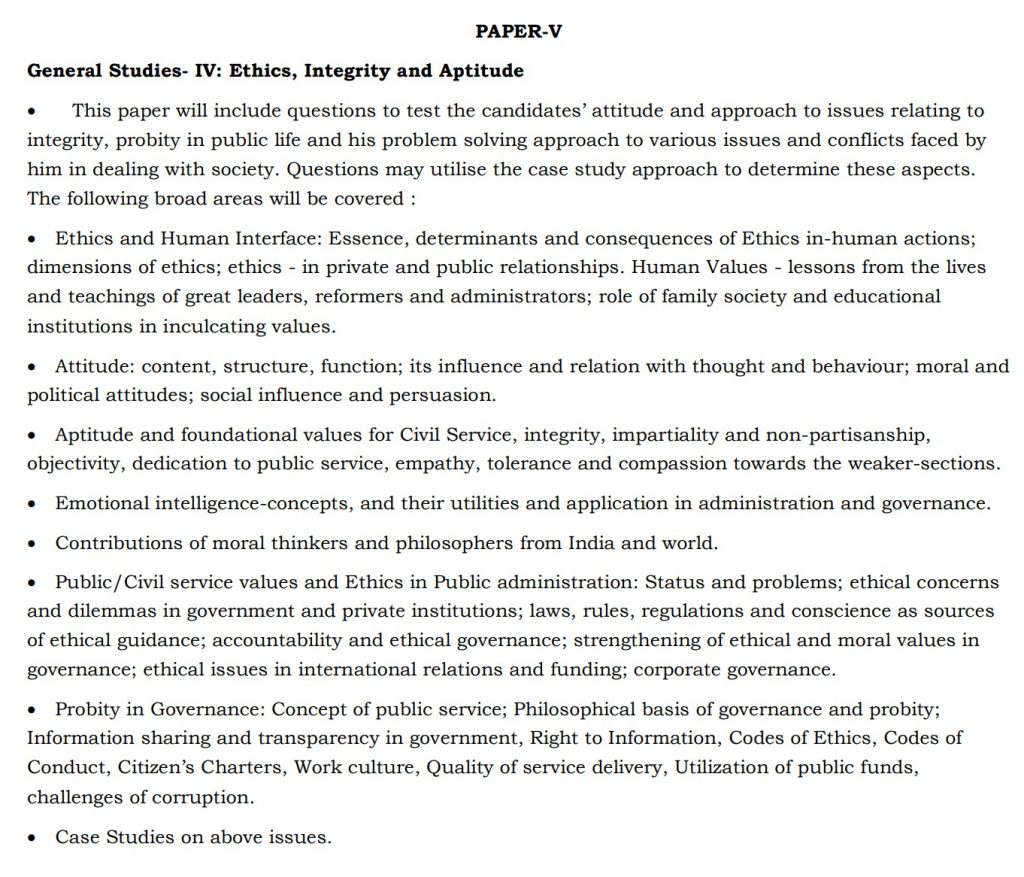
Image Courtesy: UPSC Notification 2024
The UPSC Mains 2024 GS-IV Question Paper has provided aspirants with an invaluable resource to understand the exam’s requirements and strategies for future papers. Stay tuned for more updates and insights on the UPSC Mains examination, and make sure to download the GS-IV question paper using the link provided.
Download UPSC Mains 2024 Optional Question Papers


